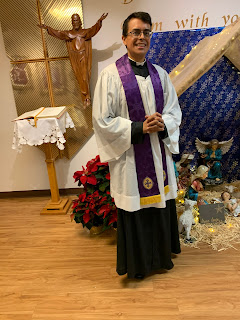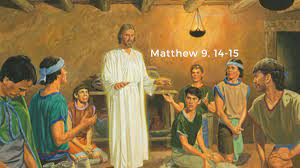Today we have a recurring guest blogger: Fr. Arthur F. Rojas, pastor of PRESENTATION OF THE B.V.M CHURCH, PORT EWEN AND SACRED HEART CHURCH, ESOPUS. For more information on this parish, check out their website at Presentation of the Blessed Virgin Mary & Sacred Heart Churches - Port Ewen - Esopus, NY (presentationsacredheart.org
Submission to the blog of Dcn. Thomas Tortorella for
II Sunday of Lent by Rev. Fr. Arthur F. Rojas (c) All rights reserved by Rev.
Fr. Arthur F. Rojas, February 21, 2024 (c)
Scripture readings for this reflection can be found at Second Sunday of Lent | USCCB
“God put Abraham to the test.” Genesis 22:1. Thus begins the first reading today in
the Ordinary Form. If we are honest with
ourselves and the sensibilities of contemporary society, the demand that God
had made of Abraham to offer his sole heir, Isaac, in sacrifice to Him may seem
harsh, cruel, and with no blasphemy meant or conveyed, even offensive to the
point of questioning how God could be good in light of His order to the holy
patriarch. However, consider the fact that our very existence, yours and mine,
is due to at least God declining to intervene against it or even allowing us to
live (God’s “permissive will”) in this time and wherever we find
ourselves. If God is truly Creator and
the Supreme Being, apart from our sins, what and who do we have that we do not
owe to Him, at least to His acquiescence?
Dear parents, if God gave your son(s) to you, then
could not God ask for at least one of them – even your only one - to serve Him
and His Holy Church as a priest, monk, friar, or religious brother? “But I want
grandchildren, Father!” (What does God
want? Does that matter?) “The family name or lineage must
continue!” (What does God have in
mind?) “I want my son(s) to be
‘successful’.” (Is the priesthood or religious life for “failures”?) “Who will take care of me when I get old or
sick?” (If you give who you value most
to the Lord, do you think that He will forget you in your time of need?) Evidently, I have heard these responses
before. Dear parents, if God gave your
daughter(s) to you, then could not God ask for at least one of them – even your
only one – to become a bride of Christ as a nun, religious sister, or
consecrated virgin? A few of the above
responses arise plus “But she is pretty, Father. What a waste to put her in the convent!” (If you trust JESUS as your Savior, then why
would you not trust Him with the heart, body, and soul of your daughter more
than any other suitor? If He finds your
daughter lovely, how you can dispute His good taste?) As St. Paul concludes today’s second reading
in the Ordinary Form, “He Who did not spare His own Son but handed Him over for us all, how will He not also give us everything else along with Him?” Romans8:32.
In St. Mark’s account of the Transfiguration (Mk9:2-10), the Gospel today in the Ordinary Form), let us suppose that St. Peter
meant well by placing Jesus on par with Moses, the liberator of Israel, and
Elijah, the greatest of the Old Testament prophets. But the Eternal Father spoke from Heaven,
identifying Jesus and Him alone as His “beloved Son. Listen to Him!” Mark 9:7.
These words from above should ground the attitudes of our parents,
grandparents, and godparents to the availability and docility of our young
people to seek, trust, and accept God’s plan for their lives on Earth and
towards Heaven.
As someone who kept God waiting to heed His call to
the sacred priesthood for years because I would not accept that what God wanted
for me was and is better than what “I” want for me, even with noble aims, I was
guilty of trying to neutralize the supremacy of God and His will by countering
and distracting with other apparently good ideas. But they were not His ends in His plan for
the world and for my place in that plan.
Although as your pastor and spiritual father (and your brother in Christ
and a fellow sinner),
I too have my challenges to follow God’s plan even today, nevertheless, may you and I exhort and support each other and especially our young people to “walk before the Lord, in the land of the living.” (cf. Psalm 116, our responsorial psalm of today).




